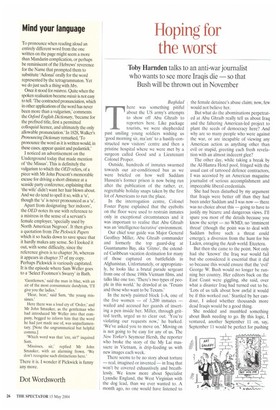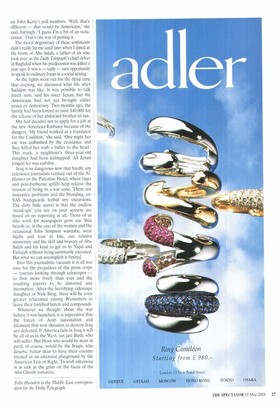Hoping for the worst
Toby Harnden talks to an anti-war journalist who wants to see more Iraqis die — so that Bush will be thrown out in November Baghdad There was something pitiful about the US army's attempts to show off Abu Ghraib to reporters here. Like package tourists, we were shepherded past smiling young soldiers wishing us 'good morning sir, ma'am' to a hastily-constructed new visitors' centre and then a pristine hospital where we were met by a surgeon called Good and a Lieutenant Colonel Proper.
Outside, hundreds of inmates swarmed towards our air-conditioned bus as we were briefed on how well Saddam Hussein's former prison is now being run after the publication of the rather, Cr, regrettable holiday snaps taken by the first lot of Americans to run the place.
In the interrogation centre, Colonel Foster Payne explained that the eyebolts on the floor were used to restrain inmates only in exceptional circumstances and it was important to realise that Abu Ghraib was an 'intelligence-lucrative' environment.
Our chief tour guide was Major General Geoffrey Miller, Abu Ghraib commander and formerly the top guard-dog at Guantanamo Bay, aka `Gitmo', the extended Caribbean vacation destination for many of those captured on battlefields in Afghanistan. Unfortunately, or appropriately, he looks like a brutal parade sergeant from one of those 1980s Vietnam films, and talks like one too. 'There's two types of people in this world,' he drawled at us. 'Texans and those who want to be Texans.'
In the newly painted block 1-A, one of the five women — of 3,200 inmates — wailed and accused her guards of inserting a pen inside her. Miller, through gritted teeth, urged us to clear out. 'You're violating our requests now,' he barked. 'We've asked you to move on.' Moving on is not going to be easy for any of us. The New Yorker's Seymour Hersh, the reporter who broke the story of the My Lai massacre in Vietnam, is drip-feeding us with new images each week.
There seems to be no story about torture — real, imagined or invented — in Iraq that won't be covered exhaustively and breathlessly. We know more about Specialist Lynndie England, the West Virginian with the dog lead, than we ever wanted to. A month ago, no one would have listened to the female detainee's abuse claim; now, few would not believe her.
But what do the abominations perpetrated at Abu Ghraib really tell us about Iraq and the faltering American-led project to plant the seeds of democracy here? And why are so many people who were against the war, or are incapable of viewing any American action as anything other than evil or stupid, greeting each fresh revelation with an almost indecent glee?
The other day, while taking a break by the Al-Hamra Hotel pool, fringed with the usual cast of tattooed defence contractors, I was accosted by an American magazine journalist of serious accomplishment and impeccable liberal credentials.
She had been disturbed by my argument that Iraqis were better off than they had been under Saddam and I was now — there was no choice about this — going to have to justify my bizarre and dangerous views. I'll spare you most of the details because you know the script — no WMD, no 'imminent threat' (though the point was to deal with Saddam before such a threat could emerge), a diversion from the hunt for bin Laden, enraging the Arab world. Etcetera.
But then she came to the point. Not only had she 'known' the Iraq war would fail but she considered it essential that it did so because this would ensure that the 'evil' George W. Bush would no longer be running her country. Her editors back on the East Coast were giggling, she said, over what a disaster Iraq had turned out to be. 'Lots of us talk about how awful it would be if this worked out.' Startled by her candour, I asked whether thousands more dead Iraqis would be a good thing.
She nodded and mumbled something about Bush needing to go. By this logic, I ventured, another September 11 on, say, September 11 would be perfect for pushing up John Kerry's poll numbers. 'Well, that's different — that would be Americans,' she said, haltingly. 'I guess I'm a bit of an isolationist.' That's one way of putting it.
The moral degeneracy of these sentiments didn't really hit me until later when I dined at the home of Abu Salah, a father of six who took over as the DaiO) Telegraph's chief driver in Baghdad when his predecessor was killed a year ago. It was a — sadly — rare opportunity to speak to ordinary Iraqis in a social setting.
As the lights went out for the third time that evening, we discussed what life after Saddam was like. It was possible to talk freely now, said his sister Jenan, but the Americans had not yet brought either peace or democracy. Two months ago, the family had been forced to raise 540.000 for the release of her abducted brother-in-law.
She had decided not to apply for a job at the new American Embassy because of the dangers. 'My friend worked as a translator for the Coalition,' she said. 'One night her car was ambushed by the resistance and they killed her with a bullet to the head.' This week, a neighbour's three-year-old daughter had been kidnapped. All Jenan longed for was stability.
Iraq is so dangerous now that hardly any television journalists venture out of the Al Hamra or the Palestine Hotel, where lager and post-barbecue spliffs help relieve the tension of being in a war zone. There are insurance problems and the brooding, ex SAS bodyguards forbid any excursions. The dirty little secret is that the endless 'stand-ups' you see on your screens are based on no reporting at all. Those of us who work for newspapers grow our Shia beards or, in the case of the women and the occasional John Simpson wannabe, wear hijabs and trust in fate, our relative anonymity and the skill and bravery of Abu Salah and his kind to get us to Najaf and Fallujah without being summarily executed. But what we can accomplish is limited.
Into this journalistic vacuum it is all too easy for the prejudices of the press corps — tourists looking through telescopes — to flow more freely than ever and the resulting reports to be distorted and incomplete. After the horrifying videotape slaughter of Nick Berg, there will be even greater reluctance among Westerners to leave their fortified hotels and compounds.
Whatever we thought about the war before it was launched, it is imperative that the forces of Arab nationalism and Islamism that now threaten to destroy Iraq are defeated. If America fails in Iraq it will be all of us in the West, not just Bush, who will suffer. But those who would be most in peril, of course, would be the Iraqis, who deserve better than to have their countr■, treated as an electoral playground by the American Left or Right. To wish otherwise is as sick as the grins on the faces of the Abu Ghraib torturers.
Toby Hamden is the Middle East correspondent for the Daily Telegraph.



































































































 Previous page
Previous page